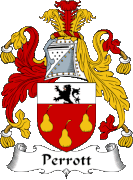P*rr*tt entries in The London Magazine
This is a selection of P*rr*tt entries found in The London Magazine or Gentleman’s Monthly Intelligencer with supplementary notes from the Editor.
1746: Ecclesiastical Preferments. Mr. Andrew Perret , to the Vicarage of Stone in Staffordshire.
Alumni Cantabrigienses records that Andrew PERRET was the son of Thomas of Yorkshire and may have been at one time a chaplain in the Navy. He reportedly died at Pershore, Worcestershire in 1790.
1761: Richard Parrot, for the murder of his wife, by cutting out her tongue … [was] executed at Tyburn … [He] was hanged in chains. Ended the sessions at the Old Bailey, at which two received sentence of death … John Perrott , a bankrupt, for concealing his effects.
Richard PARROTT, from Harmondsworth, murdered his wife Anne who he claimed “told a great many lies of him”, reportedly after an argument about who should go to the field for a cow. Anne died a few weeks after she was beaten and part of her tongue cut out. Richard had previously claimed she had put brimstone in his clothes in an attempt to kill him and Anne told their son he was paranoid and “out of his mind”. He was nonetheless deemed competent and sentenced to be hanged. John PERROTT the bankrupt was hanged for siphoning money off to his mistress and refusing to provide information about his financial affairs. By this date the death penalty for bankruptcy was highly unusual.
1780: DEATHS. Jan 30. George Perrot , Esq., late one of the Barons of the Exchequer.
George PERROT was the second son of Thomas PERROT and Anastasia PLAXTON. He had retired to Pershore following a fit of palsy at Maidstone during the Lent assizes in 1775. A monument to his memory was erected in the chancel of the parish church at Laleham, Middlesex.
1771: several quotes from Mr. Baron Perrott (George Perrott, Baron of the Exchequer) in Lord Mansfield’s Speech in the Cause of the Dissenters including: “The toleration act only amounts to an exemption of protestant dissenters from the penalties of certain laws therein particularly mentioned, and to nothing more; that if it had been intended to bear, and to have any operation upon the corporation act, the corporation act ought to have been mentioned therein; and there ought to have been some enacting clause, exempting dissenters from prosecution in consequence of this act, and enabling them to plead their not having received the sacrament according to the rites of the church of England, in bar of such action”.
Whilst the Toleration Act of 1689 had brought about some tolerance of non conformism, dissenters were still at this time prohibited from holding corporation officers under the Corporation Act of 1661.
